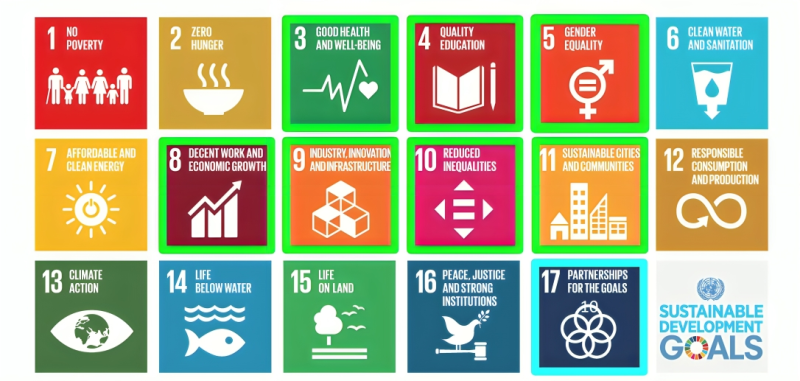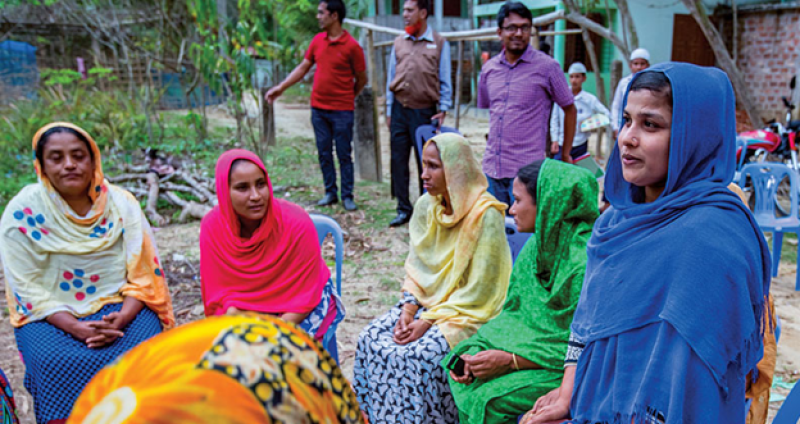Integration of energy companies and the communities in which they operate was the theme of a recent webinar hosted by SPE’s Diversity and Inclusion (D&I) Committee. Using the United Nations’ (UN) Sustainable Development Goals as the backdrop for the discussion, panelists from around the globe discussed the roles energy companies play in engaging the communities in which they operate (Fig. 1).

The event was hosted by Patricia E. Carreras, general director of Blue Moon Strategies, an energy consulting company, and chair of the D&I Committee. The panel comprised Alejandro Arbelaez, performance, framework, and standards team manager of Chevron’s Technical Center; Ignatiy Volnov, geology and reservoir deputy director department for LUKOIL overseas Iraq exploration; and Laura Precupanu, senior expert in OMV Petrom's Capability Development Value Center in Romania.
The panelists began the discussion by selecting some of the sustainable development goals and relating them to their personal and their companies’ experiences.
Arbelaez highlighted good health and well-being, quality education, and gender equality as three of the goals he has tackled throughout the years. “… any company in our industry is responsible for integrating as deeply as possible with the communities where we operate,” he said.
He shared the story of a company’s experience with the Jibika Project in Bangladesh. The project, which operated for 7 years, took place in areas near the company’s operated gas fields in Sylhet, Moulvibazar, and Habiganj districts. “Jibika worked to achieve the long-term sustainability of the community-based organizations by enhancing organizational capacity through strengthening cooperative governance and building leadership abilities,” according to a press release from the company. Arbelaez said that throughout the course of the project, nearly 800 women were able to gain leadership training and economic opportunities.
Volnov called for “help to promote substantiable an inclusive economic growth and decent work for everyone” as he discussed UN Goal 8, decent work and economic growth. He referenced recent findings from the UN which highlight that while employment may be on the rise since the COVID-19 pandemic, low-income countries are likely to see a decline in employment opportunities in 2023. Informal employment is also on the rise with women being most likely to suffer, as the UN reports four out of five jobs created in 2022 for women being informal, compared to only two out of three jobs for men (Fig. 2).

Volnov drew upon his experience with UN Goal 11, sustainable cities and communities, as he compared the development of major cities pre- and post-oil and gas industry. “The oil and gas industry has changed the phisnomy of many cities,” he said about changes in Basra, Iraq (Fig. 3).

Precupanu focused on reduced inequalities which she said, “This goal calls for, what I dare to say, eradication of the differences; this is the end goal, to eradicate the differences among individuals and among communities.”
She drew from her recent experience in Italy with a group of young professionals as part of SPE’s YP Beyond the Borders program. During the trip, they visited a village where the Val'd Agri oil field was located. The field, known for its high CO2 and H2S emissions, housed a facility where produced crude is treated. The operator discussed with the group actions they were taking to engage the local community, including providing resources for the community to operate small businesses and encouraging them to practice organic agriculture.
Precupanu touched on Goal 17, partnerships for the goals, in which she “called for transparency and to become responsible for all our actions as players in this diverse environment.”
The discussion also focused on how companies integrate and collaborate with culturally and ethnically diverse workforces in different regions with Arbelaez sharing an experience with a company expanding operations in Venezuela. The community was not familiar with oil and gas operations in their area, which led to the company creating an engagement plan to address the community’s concerns. One of the company’s responses was to provide training opportunities for working members of the community. “The community benefits because people are employed, and the company also benefits because it uses the resources that probably the community won't be using unless the company provides that opportunity,” Arbelaez said.
Precupanu shared her experience in learning about an operator present in 130 countries with employees of 160 nationalities. She applauded their work in investing in projects in their communities and warned of the potential for blind spots when you create a working environment with a lack of diversity. She said, “One manager mentioned to me how nice it is having people in your team all thinking the same as you. However, in the end, how many blind spots will you have?”
Carreras asked the panelists how companies can contribute to the social and economic development of local communities. Precupanu highlighted a company’s work with the Neptun Deep Project and how projects need to align with the community, or they risk never moving forward. The project meets various community needs including Romania’s advancement strategy, the energy transition, an extended grid, and work opportunities for contractors and subcontractors in the country.
Arbelaez encouraged companies to understand what the community needs and how they can help satisfy some of the needs. “The developing communities are not necessarily the only ones in need. Companies also need to partner with the developed communities that might have very strong financial results,” he said.
Carreras asked the panelists, “What strategies have companies implemented to ensure the inclusion and representation of marginalized groups within their workforce?”

Precupanu suggested the first step should be unbiased hiring. “If that policy is in place, every culture and ethnicity group should have their place,” she continued. Cultural awareness and training were also among her suggestions as she urged companies to consider the various aspects of diversity (Fig. 4). “We talk about gender, sexual orientation, ethnicity. To close the loop, we need to consider how to report this. As long as you report what you do, you are somehow forced to make sure that you have some objectives and then you need to report on those objectives,” she said.
Arbelaez echoed the sentiment by encouraging companies to develop and foster employee associations. “For example, I'm part of the Latino association inside my company, and what we have done through that organization is have a seat at the table when diversity and equity topics have been discussed.”
All panelists stressed the importance of educating young people and encouraged companies to participate in this important initiative. “It can be anything which educates the public to showcase the good examples that are happening in our industry and to show the public what we do for our communities, for our countries, for our regions,” Precupanu said.
“We have to educate the young generations about the affordable and reliable energy that we are providing to the world,” Arbelaez concluded.


